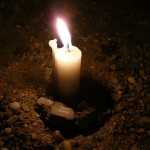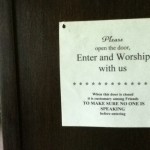Part I: A Very Differen Book From Genesis
Part II: God Becoming God
Part III: Thou Shalt Not Suffer A Witch To Live
Part IV: A Graven Image Is Worth A Thousand Words
Reading through the Hebrew scriptures is a project that might well take me the rest of my life. Almost a year after starting, I’m now only about fifteen chapters into Exodus. I’m reading simultaneously the Anchor Bible and the JPS edition of the Tanakh. It’s a personal quirk of mine that I find I prefer starting with a very technical translation and then later moving to one that’s more fluid and readable. When the Anchor Bible comes to a word where the meaning of the Hebrew is unclear, it stops and tells you so, and gives you a dozen pages of notes explaining all the possible meanings along with the specific context clues or instances of the word in other texts. I just love that stuff. The JPS on the other hand, like most translations that are designed for the general reader, will simply chose the likeliest meaning, with maybe a brief footnote at the bottom of the page. You get good English prose, but often with the sense that something’s missing somewhere.
Exodus is a very different book from Genesis–less mythic and more historic is its storytelling style. More coherent as a narrative. Fewer places where I find it shockingly bizarre in its implications.
Genesis was kind of amoral. Humanity was punished for “wickedness,” but its not at all clear from the text what that wickedness was. Shtupping with angels? More often, punishments were allotted for anything that made God nervous or insecure. Humanity ate of the tree of knowledge of good and evil, so now we’ve got to expel them from the garden lest they also eat of the tree of life and thus become gods just like us, because that would never do. But I’ll show them how to sew animal skins first, in case it gets cold out there. And the tests of Abraham were all about loyalty, not conscience. Abraham wasn’t supposed to ask whether it was right to murder his own son. God says THOU SHALT KILL and Abraham asks “How high do you want me to build the altar?” and this is a good thing. Hoo boy.
In Exodus, I suppose you start to get the first glimmerings of abstract right and wrong: oppression is wrong, and the liberation of slaves is right. Except that God, if we can take him at his word, isn’t so much interested in the welfare of his people as in performing a lot of showy wonders to glorify his name, and its important to him that Pharaoh not agree to his demands so that he can make a name for himself by luring his army out into the desert and then drowning it under the sea. Mind you, I don’t actually take God at his word here, at least not at his word as it was recorded by the human authors of the Torah. I think what we have here is a god or a vision of god (whether it’s God’s vision of himself or the people’s vision of their god is open to interpretation) but it’s a god with big ideas, a local deity who wants to identify himself with the unknowable, with God-beyond-God, with the Ground Of All Being. So he cannot admit to being in any kind of real struggle. If Pharaoh says no, then it’s got to be because God hardened his heart against the Israelites, and why would God do that? The only logical explanation is so that God could then make an example of him. Plain as the nose on your face if you can simply read the text for what it says and not impose a lot of medieval Christian philosophy on it.
One way to phrase it: Yahweh, a local Mesopotamian storm deity, was making a bid to become the acknowledged name and face for the one all-powerful unknowable Creator Of All Things and Ground Of All Being. He pins his ambitions on Abraham, an unpromising and childless Sumerian merchant, and sends him to travel and make his fortune as a nomadic shepherd. He promises Abraham that his descendents will grow to be a great nation and that the whole world will someday be blessed through them. In return, he makes repeated demands that Abraham swear absolute and unwavering loyalty to him, even pushing him to the point of agreeing to kill a son that he loves, because once you’ve said yes to that, it’s really impossible to question any later demands. Yahweh owns him after that, body and soul. Later on, when Abraham’s descendents have been enslaved in Egypt, Yahweh sees his opportunity to make an even bigger name for himself through a very ostentatious display of power culminating in the classic storm god feat of wrestling with the sea. But Yahweh himself is changed through this process, becoming deeper and wiser as he identifies more and more with that rather abstract vision of the One (and only) God. Over the centuries, his priorities shift. He becomes less insecure, less jealous, and more concerned with abstract values and with humanity as a whole. Also, as the known world becomes ever larger and the Holy Land becomes a provincial backwater of the Roman Empire, Yahweh sees that he cannot continue to represent the One God without expanding likewise. He extends his pervue, first to include gentile Christians, but becoming ever more universalist over time until it is possible to claim, today, that anyone who makes a genuine connection with the divine is encountering the one true God who is Yahweh (though other gods, and the followers of other gods, may still rankle at this).
The same story can be related from a monotheist perspective as well. No, monotheist is not the word I’m looking for. “Monotheist” has too many connotations of Thou-Shalt-Have-No-Other-Gods-Before-Me. I want a word that describes the way Cat feels about Spirit as she experiences it in Quaker Meeting. I tend to relate to that Spirit as a patron deity, perhaps because I regard all theology as ad hoc and post hoc. We experience the divine, but the experience is the only thing we can say for sure is real, so I don’t waste much time any more trying to categorize the Gods. But Cat’s experience of Spirit in meeting is that it is something beyond, something on a higher level of the Kabalistic Tree, perhaps, than the Pagan gods. And that it is somehow unitary.
So take that perspective, and retell the story of Abraham and Israel.
Yahweh still begins as a local Mesopotamian storm deity, part of an archetype that was common among the tribes of that area. But somehow–whether it comes from the god or from his chosen people, we’re not sure–there is a vision of and a longing for that One Spirit, nameless but omnipresent, that covers and unites us all. The centuries-long, back-and-forth struggle between God and his people now becomes a struggle to transcend that paradigm of loyalty to a patron deity and to create a new language and a whole new set of concepts for talking and thinking about the divine. It’s not easy, because it’s brand new. There are no precedents. There are no established habits of thought. Or rather, there are plenty of habits, but they’re the old habits that keep making us backslide. Abram says, “Tell me where to go,” and God says, “No. Just wander. My Spirit may settle here or there at different times. Follow the leadings of Spirit.” Abraham says, “I’ll make a human sacrifice, because that’s what you do for your God, right?” and God says, “No. You can show me your willingness, if that’s what you feel you need to do, but do not kill for me this son that you and I both love. Take this ram instead, and let that be a sign that from this day forward there will be no more human sacrifice in my name.” Moses says, “Free us from Egypt,” and God says, “No. You can free the people yourself if you open yourself to Spirit. Just as Aaron takes your vision and speaks it to the people, so you can take inspiration from Spirit and speak it to Aaron. But know that if Pharaoh is steadfast in opposing you, it is because he also draws strength from Spirit.” Moses says, “I see! You’re hardening his heart so that everyone will be able to see how mighty you are, and your name will be magnified!” and God says, “Oy veh. That’ll have to do for now, I suppose. I’ll send you some prophets later to clarify things, but for now here’s ten fairly straightforward rules we can use as a starting place.”
That’s a very Quaker reading of the OT, and a very liberal Quaker reading at that. I am doing exactly what I said not to a couple of paragraphs ago: imposing a lot of preconceptions on what I’m reading. But, along with my instinct to simply let the writer say what he wanted to say, I also have to ask, What did God mean by that? God is real, all the gods are real, Spirit is real, Yahweh is real…or at least our experiences of them are real, and those experiences have enough of a tendency to recur–the experiments can be replicated–in a way that lends a certain object permanence to the things experienced.
The writers of Genesis and Exodus lived in a world very different from our own and operated with a completely different set of assumptions and paradigms about the gods. On the one hand, it is crucial to let in that reality, and to strive to listen openly to Spirit as it spoke to them. And at the same time, Spirit persists, and my experience of Spirit today will–must and should–inform my understanding of their experiences of Spirit. It’s a kind of double vision, experiencing the Light as both particle and wave. Hold the contradiction. Walk from Truth to Truth as you would from room to room.
My personal issues with Christianity have to do with the emphasis on fidelity and the blindness of so many Christians to the reality of God’s love outside the doors of the church. The need to insist that This is good must imply That is bad. But if even Pharaoh was acting from the promptings of Spirit, then maybe I can acknowledge that narrow-minded Christians are, too.
The God that sits there behind the stories in the Bible is kind of inscrutable. I once had a vision of the veiled, star-eyed Goddess holding out Her chalice to me, and I asked Her who She was. She answered that I should know better than to ask such a question.
Enough for now.











